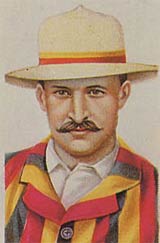R. E. Foster
|
|

|
MR. R. E. FOSTER was born on the 16th of April, 1878, and was thus a little over 22 when he, last summer, sprang so suddenly to the very top of the tree. We can recall no instance of an Oxford or Cambridge batsman making such an extraordinary advance in his last year at the University. The closest parallel, at any rate in recent years, can be found in the career of Mr F. S. Jackson, but that great cricketer was far more celebrated in 1892 - his third year at Cambridge - than Mr. Foster was in 1899.
To use a hackneyed phrase, the Oxford captain in the course of a twelvemonth improved out of knowledge. He was a very promising bat during his school days at Malvern, but well as he scored for Worcestershire in 1899, making it will be remembered two separate hundreds against Hampshire at Worcester, he would scarcely at the end of the season have been given a place in the third eleven of England. Last July, after his triumphs in the University match and Gentlemen and Players match at Lord's, he would, had there been occasion to put a representative team into the field against Australia, have secured his place with acclamation.
As everyone knows he beat the record in the University match with a score of 171, and then - a feat without precedent in Gentlemen and Players matches - made 102 not out and 136 for the Gentlemen. Moreover, his record for Oxford for the season has never - having regard to the number of innings played - been equalled for either University.
Playing for Worcestershire after his great performances at Lord's, he did not quite keep up his form, but he still did well enough, and as allowance must always be made for the importance of the matches in which big scores are obtained, he had some claim at the end of the summer to be regarded as the batsman of the season.
His experience, as we have already implied, is altogether different to that of the majority of great University batsmen. R. A. H. Mitchell, C. G. Lyttelton, William Yardley, C. J. Ottaway, Alfred Lyttelton, and A. P. Lucas were almost as good when they first played in the University match as they ever became afterwards. C. T. Studd ripened more slowly, but no doubt was felt when he left Eton that he would do great things. Many fine batsmen have done their best before leaving the Universities, but Mr. Foster - assuming that he can spare time to keep up the game - is very likely only at the beginning of his real career.
As a batsman he has almost every good quality - a strong defence, self-restraint when it is needed, a free, attractive style, and truly magnificent hitting powers all round the wicket. Scarcely anyone, Ranjitsinhji excepted, hits with less apparent effort, his facility in this respect being due to the possession of wrists that must be marvels of strength and suppleness. Like most of the younger batsmen in these days he has carried the art of pulling to great perfection, but we like better his splendid driving on the off side, and the safety with which he makes his late cut, a stroke which he brings off in a way peculiarly his own. C. B. Fry, who was in with him for a long time in the Gentlemen and Players match, was especially struck by the way in which he worked some of Walter Mead's best length balls round to leg for easy fours, watching the ball off the pitch and using a quick turn of the wrist at the last moment, and described him as quicker with his bat than anyone now playing, save Ranjitsinhji. He also said that the performance against the Players gave him a far higher notion of Foster's powers than even the big innings in the University match.
It is a pleasure to quote Mr Fry on a point like this, as no one has a keener appreciation of his contemporaries in the cricket field or a happier way of describing their peculiarities. Mr Foster does not set much store on his bowling, only going on on rare occasions for a few overs, but as a fieldsman he is very brilliant indeed - quite one of the best slips in England at the present time. Like his brothers W. L., and H. K., he practically learnt all his cricket at Malvern, and he was in the Oxford eleven for four years, earning his place as a Freshman in 1897. In that year he scored 27 and 6 against Cambridge, in 1898, 57; and in 1899, 21 and 11. In 1897 he was sixth in the Oxford batting with an average of 19; in 1898 third with an average of 22; and in 1899 fifth with average of 29. There was thus little in his University career up to last May to suggest his triumphs in 1900.

